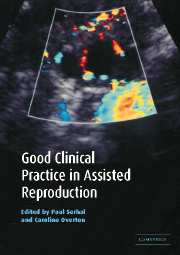Book contents
- Frontmatter
- Contents
- List of contributors
- Foreword by Bob Edwards
- Preface
- 1 Clinical assessment of the woman for assisted conception
- 2 Clinical assessment and management of the infertile man
- 3 Laboratory assessment of the infertile man
- 4 Donor insemination
- 5 Treatment options prior to IVF
- 6 Strategies for superovulation for IVF
- 7 Techniques for IVF
- 8 Ovarian hyperstimulation syndrome
- 9 Early pregnancy complications after assisted reproductive technology
- 10 Oocyte donation
- 11 Surrogacy
- 12 Clinical aspects of preimplantation genetic diagnosis
- 13 Controversial issues in assisted reproduction
- 14 Alternatives to in vitro fertilization: gamete intrafallopian transfer and zygote intrafallopian transfer
- 15 Counselling
- 16 Good nursing practice in assisted conception
- 17 Setting up an IVF unit
- 18 Information technology aspects of assisted conception
- 19 Assisted reproductive technology and older women
- 20 Ethical aspects of controversies in assisted reproductive technology
- Index
- Plate section
15 - Counselling
Published online by Cambridge University Press: 22 October 2009
- Frontmatter
- Contents
- List of contributors
- Foreword by Bob Edwards
- Preface
- 1 Clinical assessment of the woman for assisted conception
- 2 Clinical assessment and management of the infertile man
- 3 Laboratory assessment of the infertile man
- 4 Donor insemination
- 5 Treatment options prior to IVF
- 6 Strategies for superovulation for IVF
- 7 Techniques for IVF
- 8 Ovarian hyperstimulation syndrome
- 9 Early pregnancy complications after assisted reproductive technology
- 10 Oocyte donation
- 11 Surrogacy
- 12 Clinical aspects of preimplantation genetic diagnosis
- 13 Controversial issues in assisted reproduction
- 14 Alternatives to in vitro fertilization: gamete intrafallopian transfer and zygote intrafallopian transfer
- 15 Counselling
- 16 Good nursing practice in assisted conception
- 17 Setting up an IVF unit
- 18 Information technology aspects of assisted conception
- 19 Assisted reproductive technology and older women
- 20 Ethical aspects of controversies in assisted reproductive technology
- Index
- Plate section
Summary
Infertility is a silent loss; generally unrecognized in our society (Applegarth, 1990). The Assisted Conception Unit can be the place where, during the process of treatment, this loss can be given a voice and a hearing. There is now increasing international recognition of the necessity to understand, encompass and make explicit the psychological and emotional dimension of the experience of impaired fertility. Good practice means that the consequent use of assisted reproductive technology should therefore be inextricably linked with counselling provision. In the United Kingdom, a licensed assisted conception unit is legally obliged to ensure that counselling is available for anybody contemplating fertility treatment. The words ‘assisted conception’ encapsulate a process by which procreation is replaced by reproduction. The consciousness of the possibility of the creation of life by sexual intercourse is one of the most private, primitive, internal and mysterious aspects of being human. The mystery is replaced by the ‘unnatural’ and public intervention of a third party – the clinician/scientist. This is a loss. The need for intervention can cause profound distress and the negative psychological impact of chronic infertility can be equally as serious as that seen in potentially fatal medical conditions (Donmar et al., 1993).
The public requirement for counselling
From the birth of the first IVF baby in 1978, there has been both intense public concern about the vulnerability of potential users, the welfare of children either created or affected by the use of ART and a real fear of uncontrolled scientific development.
Keywords
- Type
- Chapter
- Information
- Good Clinical Practice in Assisted Reproduction , pp. 266 - 276Publisher: Cambridge University PressPrint publication year: 2004

